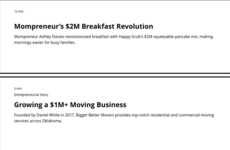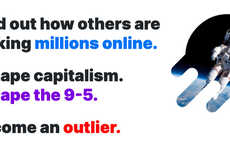
Shelby Lee Walsh — October 6, 2009 — About
References: idea-sandbox & freshpeel
Founder of TrendHunter.com, Jeremy Gutsche, is participating in the Post2Post Virtual Book Tour featuring his breakout book EXPLOITNG CHAOS: 150 Ways To Spark Innovation During Times of Change. The virtual book tour has begun with the website The Marketing Fresh Peel and below you can have a look at a few questions with Gutsche. For the full interview, check out [url=”
The][url=http://freshpeel.com/2009/10/interview-with-professional-trend-spotter-and-author-jeremy-gutsche/”]The]http://freshpeel.com/2009/10/interview-with-professional-trend-spotter-and-author-jeremy-gutsche/”]The[/url] Marketing Peel[/url]‘s website!
The Fresh Peel is pleased to welcome Jeremy Gutsche, founder of the wildly popular TrendHunter.com and author of Exploiting Chaos: 150 Ways to Spark Innovation During Times of Change, which is the featured book for October’s stop on the Post2Post Virtual Book Tour.
Not only is Jeremy one of the founders at TrendHunter, but he is also a highly sought after speaker. He was one of Capital One’s youngest Business Directors and innovation leads. Prior to Capital One, Jeremy advised top-level strategy to Fortune 50 and government clients as a Management Consultant at the Monitor Group.
In this interview, I picked Jeremy’s brain on everything from finding innovation out of chaos to what his response is to opponents of trend spotting.
—–
Q: Is chaos a necessary ingredient for innovation?
Jeremy: It’s not required, but during periods of chaos, consumer needs change. This presents an opportunity for companies who are able to identify these needs.
Q: What are some things that history teaches us about chaos and crisis?
Jeremy: People get caught up in the downsides of the depression, but history teaches us that these times consistently provide us with new opportunities. In fact, some of the most iconic companies were founded during chaotic periods of economic downturns, including: Apple, Microsoft, General Electric, Amgen, Hyatt, HP, EA, and Fortune Magazine.
Fortune Magazine, for instance, was founded just four months AFTER the 1929 Wall Street crash. It was a dollar an issue (the price of a wool sweater), but it thrived. DURING the Great Depression, a subscriber base of 500,000 was grown, and the magazine made seven million dollars in modern day profit. The reason Fortune was successful was not because it was a luxury publication, but rather, because consumer needs had evolved. When people lost their jobs and saw the world changed by the decisions made by NYC based corporations, they wanted to know what was happening behind boardroom doors. Fortune was an answer; an answer to a new consumer need.
Click [url=”
here][url=http://freshpeel.com/2009/10/interview-with-professional-trend-spotter-and-author-jeremy-gutsche/”]here]http://freshpeel.com/2009/10/interview-with-professional-trend-spotter-and-author-jeremy-gutsche/”]here[/url][/url] for the rest of the interview!
The][url=http://freshpeel.com/2009/10/interview-with-professional-trend-spotter-and-author-jeremy-gutsche/”]The]http://freshpeel.com/2009/10/interview-with-professional-trend-spotter-and-author-jeremy-gutsche/”]The[/url] Marketing Peel[/url]‘s website!
Interview with Professional Trend Spotter and Author Jeremy Gutsche
The Fresh Peel is pleased to welcome Jeremy Gutsche, founder of the wildly popular TrendHunter.com and author of Exploiting Chaos: 150 Ways to Spark Innovation During Times of Change, which is the featured book for October’s stop on the Post2Post Virtual Book Tour.
Not only is Jeremy one of the founders at TrendHunter, but he is also a highly sought after speaker. He was one of Capital One’s youngest Business Directors and innovation leads. Prior to Capital One, Jeremy advised top-level strategy to Fortune 50 and government clients as a Management Consultant at the Monitor Group.
In this interview, I picked Jeremy’s brain on everything from finding innovation out of chaos to what his response is to opponents of trend spotting.
—–
Q: Is chaos a necessary ingredient for innovation?
Jeremy: It’s not required, but during periods of chaos, consumer needs change. This presents an opportunity for companies who are able to identify these needs.
Q: What are some things that history teaches us about chaos and crisis?
Jeremy: People get caught up in the downsides of the depression, but history teaches us that these times consistently provide us with new opportunities. In fact, some of the most iconic companies were founded during chaotic periods of economic downturns, including: Apple, Microsoft, General Electric, Amgen, Hyatt, HP, EA, and Fortune Magazine.
Fortune Magazine, for instance, was founded just four months AFTER the 1929 Wall Street crash. It was a dollar an issue (the price of a wool sweater), but it thrived. DURING the Great Depression, a subscriber base of 500,000 was grown, and the magazine made seven million dollars in modern day profit. The reason Fortune was successful was not because it was a luxury publication, but rather, because consumer needs had evolved. When people lost their jobs and saw the world changed by the decisions made by NYC based corporations, they wanted to know what was happening behind boardroom doors. Fortune was an answer; an answer to a new consumer need.
Click [url=”
here][url=http://freshpeel.com/2009/10/interview-with-professional-trend-spotter-and-author-jeremy-gutsche/”]here]http://freshpeel.com/2009/10/interview-with-professional-trend-spotter-and-author-jeremy-gutsche/”]here[/url][/url] for the rest of the interview!
Trend Themes
1. Chaos as an Opportunity - During chaotic times consumer needs change, presenting an opportunity for companies to identify and innovate to meet these needs.
2. Innovation During Economic Crisis - Economic downturns provide new opportunities for innovation and creation, as evidenced by iconic companies like Apple, Microsoft, and General Electric.
3. Spotting Trends - Understanding and engaging with emerging trends can provide valuable insights for businesses looking to adapt and stay ahead of the competition.
Industry Implications
1. Technology - The technology industry is constantly changing, presenting opportunities for companies to innovate and anticipate new consumer needs during periods of chaos.
2. Consumer Goods - Consumer goods companies can benefit from identifying and adapting to emerging trends, especially during times of economic downturns when consumer needs and preferences may shift.
3. Business Consulting - As a Management Consultant, Jeremy Gutsche advised Fortune 50 companies and government clients on top-level strategies, making business consulting a potentially disruptive industry for innovation during times of change.
0.8
Score
Popularity
Activity
Freshness























